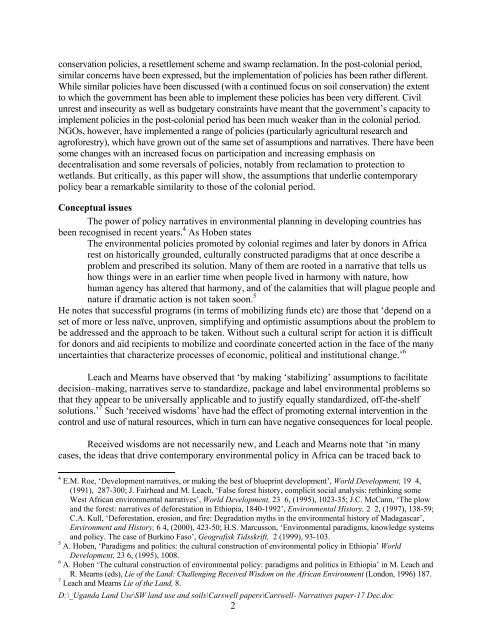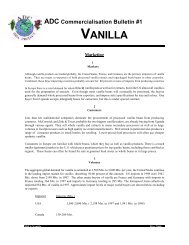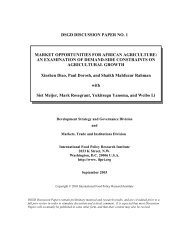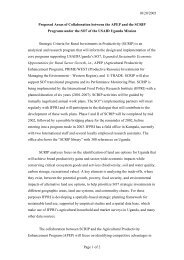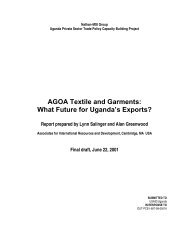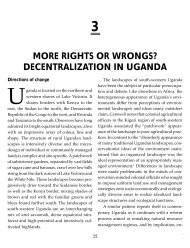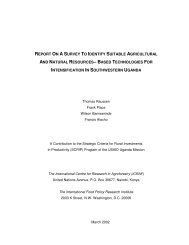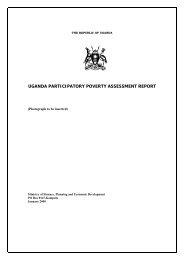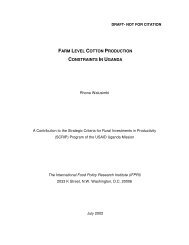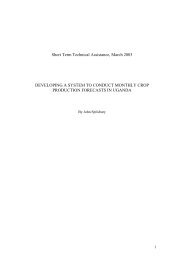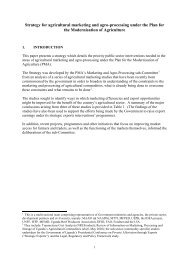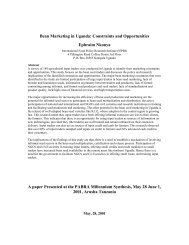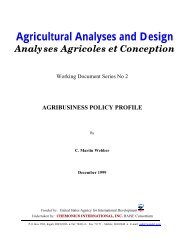Continuities in environmental narratives, Kabale, Uganda ... - Foodnet
Continuities in environmental narratives, Kabale, Uganda ... - Foodnet
Continuities in environmental narratives, Kabale, Uganda ... - Foodnet
You also want an ePaper? Increase the reach of your titles
YUMPU automatically turns print PDFs into web optimized ePapers that Google loves.
conservation policies, a resettlement scheme and swamp reclamation. In the post-colonial period,<br />
similar concerns have been expressed, but the implementation of policies has been rather different.<br />
While similar policies have been discussed (with a cont<strong>in</strong>ued focus on soil conservation) the extent<br />
to which the government has been able to implement these policies has been very different. Civil<br />
unrest and <strong>in</strong>security as well as budgetary constra<strong>in</strong>ts have meant that the government’s capacity to<br />
implement policies <strong>in</strong> the post-colonial period has been much weaker than <strong>in</strong> the colonial period.<br />
NGOs, however, have implemented a range of policies (particularly agricultural research and<br />
agroforestry), which have grown out of the same set of assumptions and <strong>narratives</strong>. There have been<br />
some changes with an <strong>in</strong>creased focus on participation and <strong>in</strong>creas<strong>in</strong>g emphasis on<br />
decentralisation and some reversals of policies, notably from reclamation to protection to<br />
wetlands. But critically, as this paper will show, the assumptions that underlie contemporary<br />
policy bear a remarkable similarity to those of the colonial period.<br />
Conceptual issues<br />
The power of policy <strong>narratives</strong> <strong>in</strong> <strong>environmental</strong> plann<strong>in</strong>g <strong>in</strong> develop<strong>in</strong>g countries has<br />
been recognised <strong>in</strong> recent years. 4 As Hoben states<br />
The <strong>environmental</strong> policies promoted by colonial regimes and later by donors <strong>in</strong> Africa<br />
rest on historically grounded, culturally constructed paradigms that at once describe a<br />
problem and prescribed its solution. Many of them are rooted <strong>in</strong> a narrative that tells us<br />
how th<strong>in</strong>gs were <strong>in</strong> an earlier time when people lived <strong>in</strong> harmony with nature, how<br />
human agency has altered that harmony, and of the calamities that will plague people and<br />
nature if dramatic action is not taken soon. 5<br />
He notes that successful programs (<strong>in</strong> terms of mobiliz<strong>in</strong>g funds etc) are those that ‘depend on a<br />
set of more or less naïve, unproven, simplify<strong>in</strong>g and optimistic assumptions about the problem to<br />
be addressed and the approach to be taken. Without such a cultural script for action it is difficult<br />
for donors and aid recipients to mobilize and coord<strong>in</strong>ate concerted action <strong>in</strong> the face of the many<br />
uncerta<strong>in</strong>ties that characterize processes of economic, political and <strong>in</strong>stitutional change.’ 6<br />
Leach and Mearns have observed that ‘by mak<strong>in</strong>g ‘stabiliz<strong>in</strong>g’ assumptions to facilitate<br />
decision–mak<strong>in</strong>g, <strong>narratives</strong> serve to standardize, package and label <strong>environmental</strong> problems so<br />
that they appear to be universally applicable and to justify equally standardized, off-the-shelf<br />
solutions.’ 7 Such ‘received wisdoms’ have had the effect of promot<strong>in</strong>g external <strong>in</strong>tervention <strong>in</strong> the<br />
control and use of natural resources, which <strong>in</strong> turn can have negative consequences for local people.<br />
Received wisdoms are not necessarily new, and Leach and Mearns note that ‘<strong>in</strong> many<br />
cases, the ideas that drive contemporary <strong>environmental</strong> policy <strong>in</strong> Africa can be traced back to<br />
4<br />
E.M. Roe, ‘Development <strong>narratives</strong>, or mak<strong>in</strong>g the best of bluepr<strong>in</strong>t development’, World Development, 19 4,<br />
(1991), 287-300; J. Fairhead and M. Leach, ‘False forest history, complicit social analysis: reth<strong>in</strong>k<strong>in</strong>g some<br />
West African <strong>environmental</strong> <strong>narratives</strong>’, World Development, 23 6, (1995), 1023-35; J.C. McCann, ‘The plow<br />
and the forest: <strong>narratives</strong> of deforestation <strong>in</strong> Ethiopia, 1840-1992’, Environmental History, 2 2, (1997), 138-59;<br />
C.A. Kull, ‘Deforestation, erosion, and fire: Degradation myths <strong>in</strong> the <strong>environmental</strong> history of Madagascar’,<br />
Environment and History, 6 4, (2000), 423-50; H.S. Marcusson, ‘Environmental paradigms, knowledge systems<br />
and policy. The case of Burk<strong>in</strong>o Faso’, Geografisk Tidsskrift, 2 (1999), 93-103.<br />
5<br />
A. Hoben, ‘Paradigms and politics: the cultural construction of <strong>environmental</strong> policy <strong>in</strong> Ethiopia’ World<br />
Development, 23 6, (1995), 1008.<br />
6<br />
A. Hoben ‘The cultural construction of <strong>environmental</strong> policy: paradigms and politics <strong>in</strong> Ethiopia’ <strong>in</strong> M. Leach and<br />
R. Mearns (eds), Lie of the Land: Challeng<strong>in</strong>g Received Wisdom on the African Environment (London, 1996) 187.<br />
7<br />
Leach and Mearns Lie of the Land, 8.<br />
D:\_<strong>Uganda</strong> Land Use\SW land use and soils\Carswell papers\Carswell- Narratives paper-17 Dec.doc<br />
2


